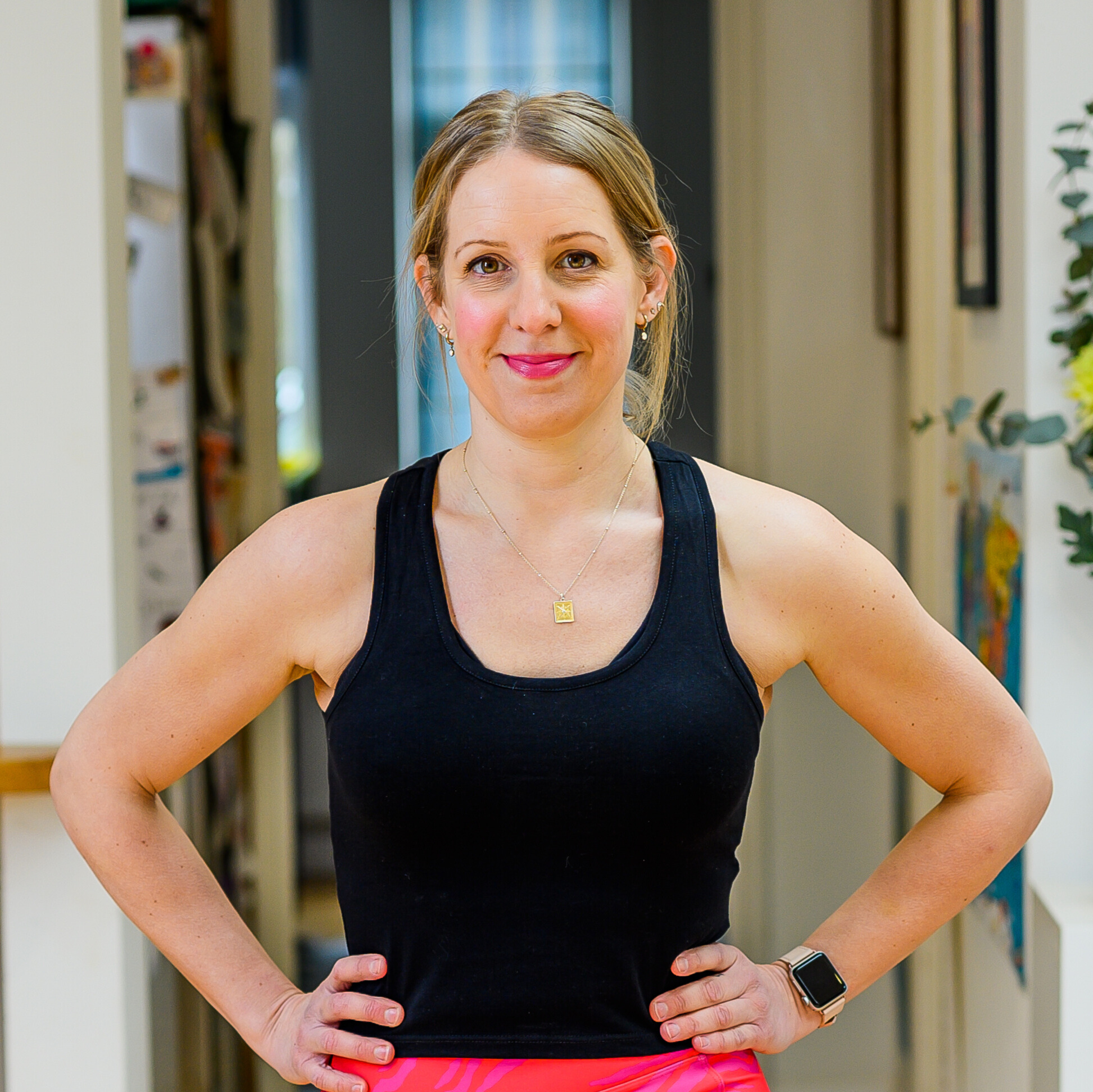This low-impact menopause strength workout builds muscle all over in just eight moves
Strengthen your core, develop stabilizing muscle, and boost your metabolism with this short dumbbell routine

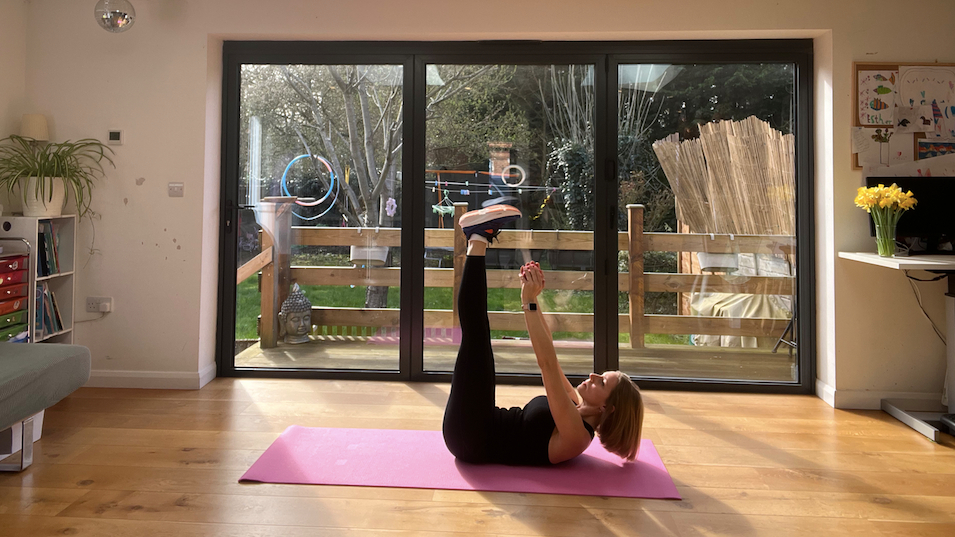
Incorporating a menopause strength workout into your fitness regime can help build muscle and protect your bones, improve your metabolic rate, and boost cardiovascular health and overall wellbeing.
The menopausal transition affects each woman uniquely and in various ways: the body begins to use energy differently, fat cells change, and you may gain weight more easily.
Changes in bone or heart health, body composition or physical function are common, which is why many people take the best menopause supplements to try and ease the symptoms and support their bodies.
However, maintaining muscle as you get older helps improve your mobility, supports the muscles around your bones, and increases your metabolism (the amount of energy you burn throughout the day), which naturally slows as you age.
But there's a common perception that you need to head to the gym and lift heavy weights to get the benefits. Fortunately, that's not the case, as this eight-move menopause strength workout is easy on your joints, and you only need two dumbbells to get started.
Eight-move menopause strength workout
For this menopause strength workout you will need a mat, a set of dumbbells, and some water. If you're new to weights training, aim for 4-6lbs, up to 10lbs if you've done some training before, and 18lbs if weights are a regular part of your routine—but choose what feels most comfortable for you.
There are eight moves in this routine, and the aim is to do them for 30 seconds each, resting for 40 seconds between exercises. To increase the intensity, gradually reduce the break down to 30 or 20 seconds.
Start your week with achievable workout ideas, health tips and wellbeing advice in your inbox.
To get the most from your training and avoid injury, it's vital to learn how to warm up before a workout. This gets oxygen to your muscles to prepare them for the session ahead and may reduce the effects of delayed-onset muscle soreness (DOMS).
Menopause strength workout plan
| Exercise | Time | Rest | Sets |
|---|---|---|---|
| Weighted squat thrusters | 30 seconds | 40 seconds | 1-2 |
| Dumbbell goblet squat pulse | 30s | 40s | 1-2 |
| Lateral arm raise to front raise squats | 30s | 40s | 1-2 |
| Curtsy lunge and bicep curls | 30s | 40s | 1-2 |
| Dumbbell halo | 30s | 40s | 1-2 |
| Standing overhead tricep extension | 30s | 40s | 1-2 |
| Single dumbbell toe touches | 30s | 40s | 1-2 |
| Weighted side lying leg raises | 30s | 40s | 1-2 |
1. Weighted squat thrusters
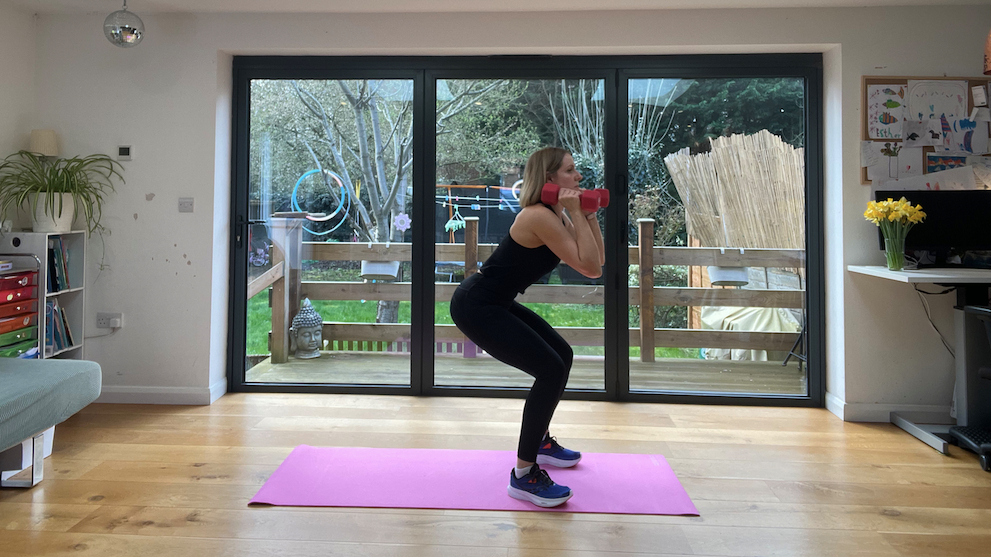
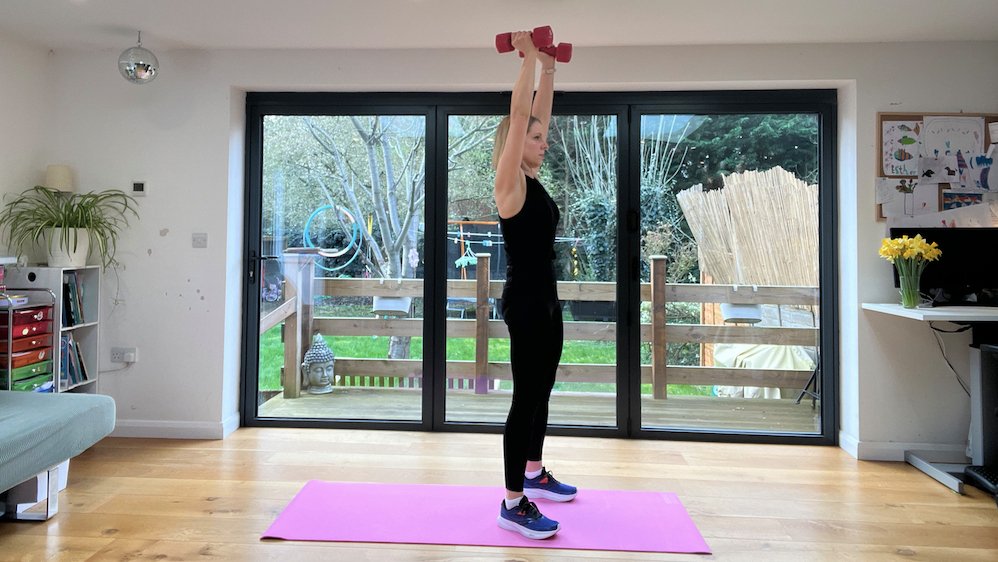
Muscles worked: posterior chain (legs, back, glutes), abs, pectorals, hamstrings, triceps, shoulders (deltoids)
- Position the dumbbells just above your shoulders, elbows in tight, and engage your core.
- Take your feet shoulder width apart. Keeping your back straight, squat down as if you were sitting into a chair. From this position, press up through the heels, squeeze the glutes and use your leg and butt muscles to drive back up.
- As you drive up, push the weights straight up above your head. Bring them back down as you squat again, then repeat this movement for 30 seconds. Keep your chest and head lifted at all times.
2. Dumbbell goblet squat pulse
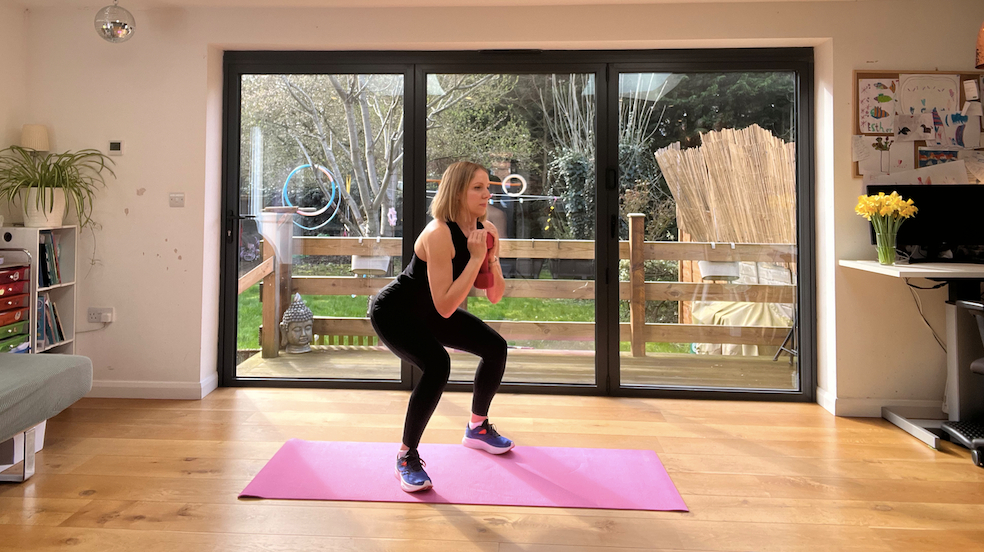
Muscles worked: quads, calves, hamstring, hip flexors, outer thighs, glutes, shoulders, chest, triceps, and back
- Hold the weight in front of your chest with palms facing up around the weight and the dumbbell in a vertical position.
- With feet shoulder width apart, pull shoulder blades back together tightly to maintain neutral spine throughout the exercise. Keep your chin tucked in.
- Hinge at the hips and drive back into a squat position. The dumbbell should remain under your chin. Hold that low squat position and then pulse (tiny movements up and down) for 30 seconds.
3. T-shape lateral arm raise to front raise squats
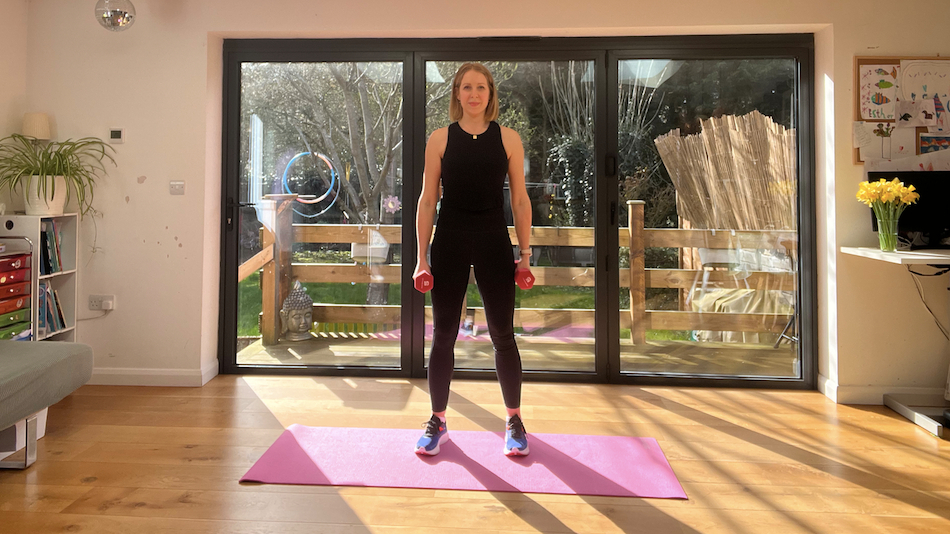
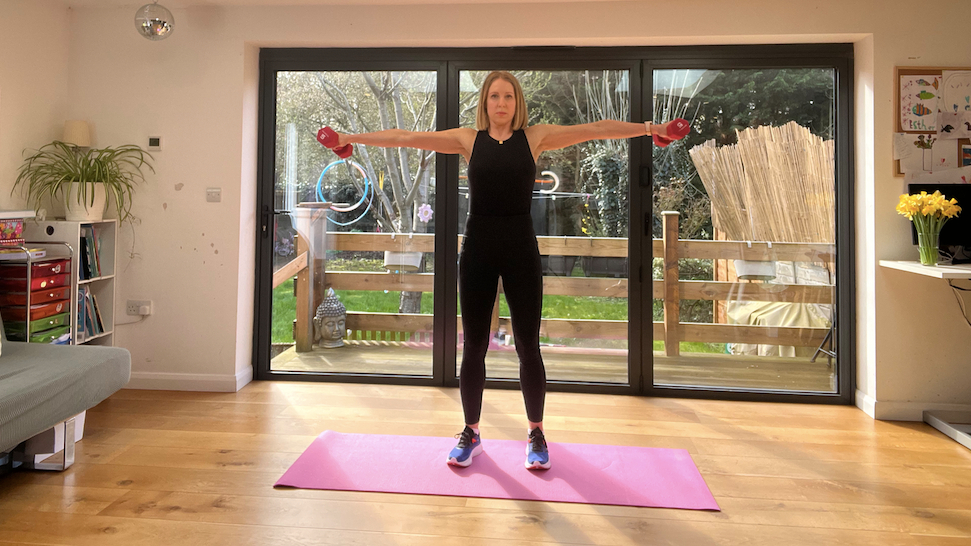
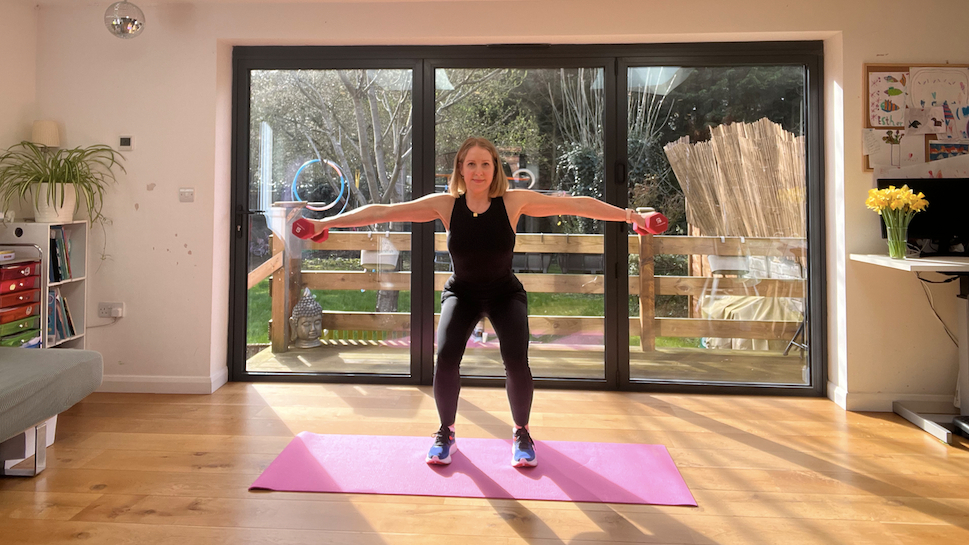
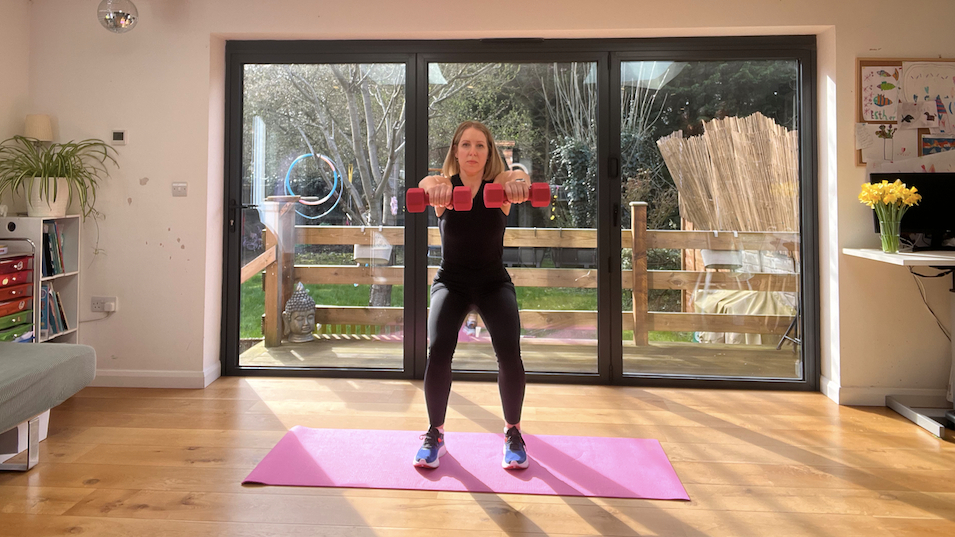
Muscles worked: quads, glutes, calves, hamstrings, erector spinae (controls rotation of the back), rectus abdominis (the six-pack muscle), internal and external obliques, deltoids (shoulders), biceps, pectoralis major, and trapezius (upper back)
- Start with feet hip-width apart and the weights in your hands by your side. Raise your arms to the side into a T-shape as you squat down. To squat, hinge at the knees, lower down and push back with the hips as if you are sitting back into a chair. Keep your knees stacked over your toes.
- Bring your arms into a front raise position, still in your lower squat position, then push through your heels to power back up to standing squeezing your glutes at the top. As you come up from the squat, lower your arms back down to your thighs. That’s one repetition.
4. Curtsy lunge to bicep curl
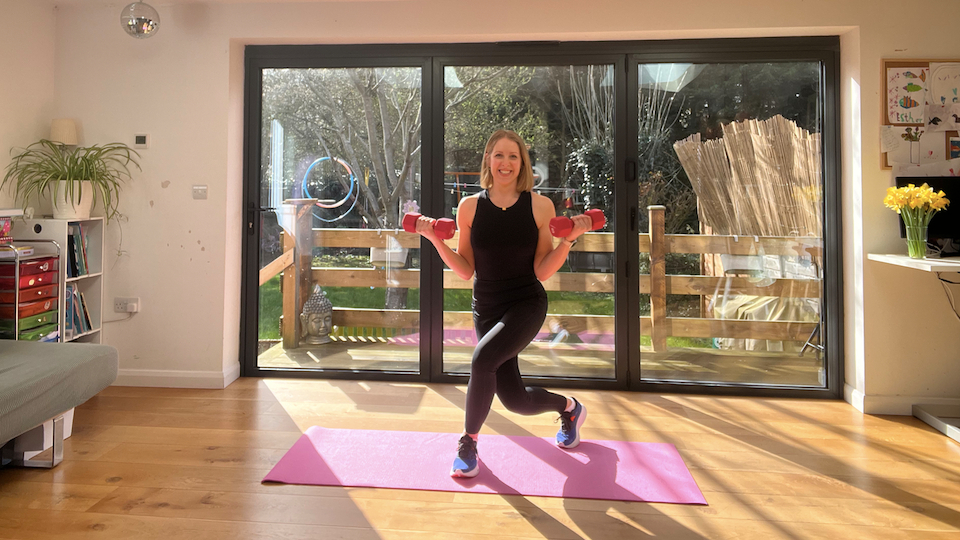
Muscles worked: gluteus medius, hip adductors, quads, hamstrings, and biceps
- Stand with feet hip width apart with weights in your hands by your side, shoulders back, and core engaged. Putting your weight into your right foot, step back and around with your left foot—almost as if you’re curtsying. Lunge down, bending your knees and lowering your hips until your left thigh is nearly parallel to the floor.
- Hold that low curtsy lunge position as you do a bicep curl—with palms facing upward, slowly curl the weight up bending at the elbow, keeping elbows close to your body. Slowly lower the weight to the starting position.
- Once you’ve done your bicep curl, begin to straighten your right leg, pushing up through your heel, and returning your left foot to the starting position. That’s one repetition. Swap legs and repeat on alternate legs.
5. Dumbbell halo
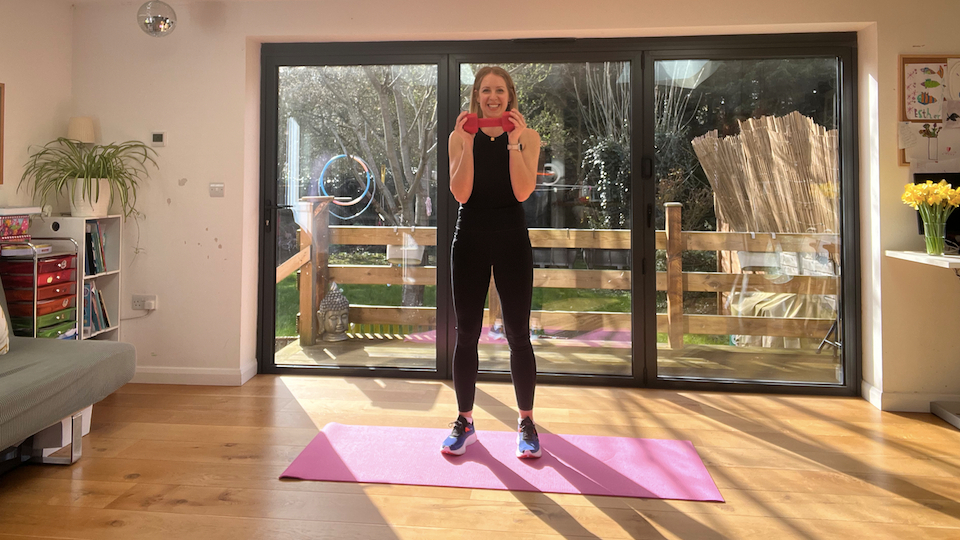
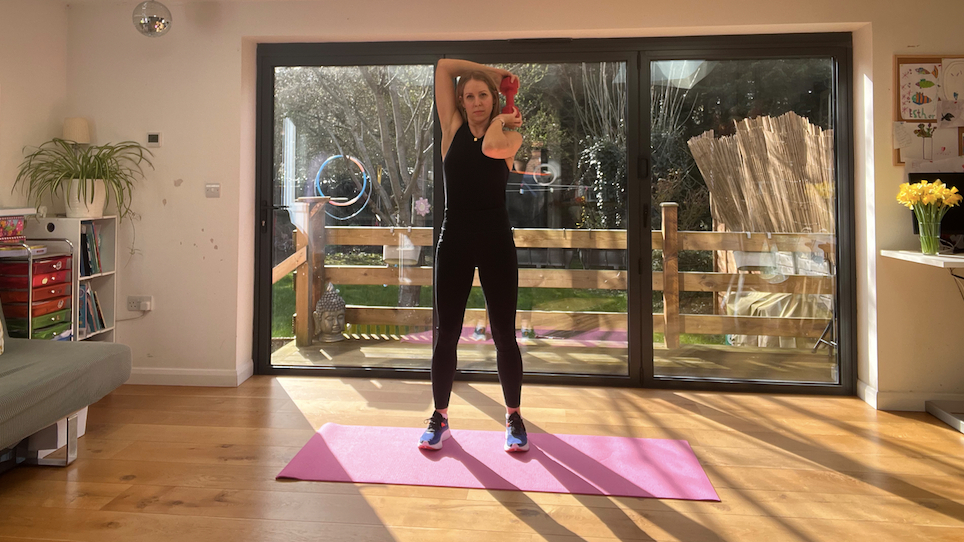
Muscles worked: deltoids, trapezius, pectorals, and triceps
- Hold one dumbbell sideways and bring it to eye level.
- Rotate the weight in a circular motion anti-clockwise around your head in a circle like a halo.
- Repeat in the opposite direction then change again. Alternate like this for 30 seconds.
6. Overhead triceps extension
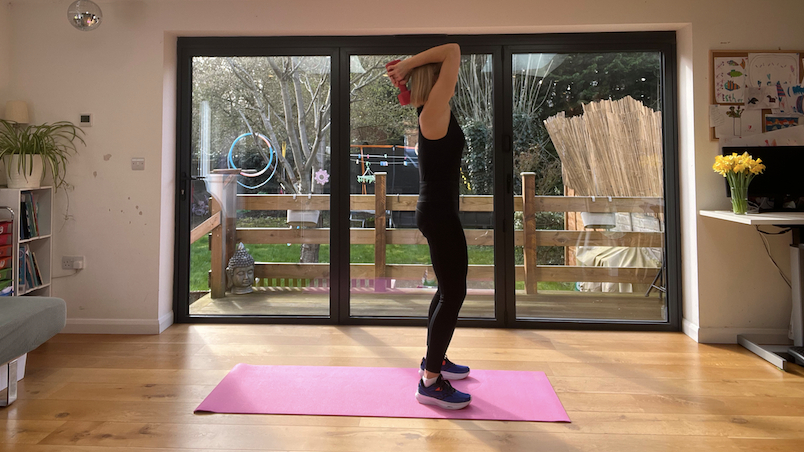
Muscles worked: triceps
- You can do this exercise standing or seated on a chair or exercise bench.
- Hold a single dumbbell and make a triangle with your hands so the palm is on the top of the weight. Bring the weight over your head and keep your elbows glued to your ears, pointing forward not flared out to the sides.
- Bring the weight down and as you come up, squeeze your triceps. Keep your core tight and come down low.
7. Weighted toe touches
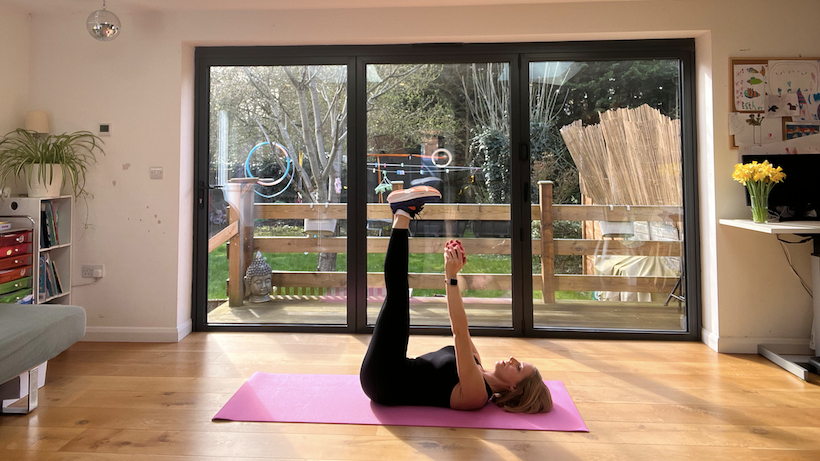

Muscles worked: transverse abdominis, rectus abdominis, and obliques
- Lie on your back with your core braced, back flat on the mat, and your legs straight in the air.
- Hold a single dumbbell sideways directly over your chest with arms fully extended.
- Take a deep breath then exhale as you use your stomach muscles and core to reach towards your toes with the weight. Slowly and with control lower to start position. That’s one repetition.
8. Weighted side-lying leg raise
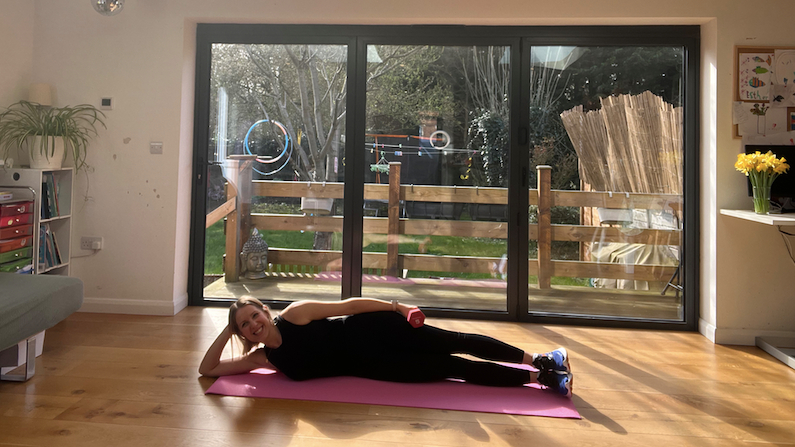
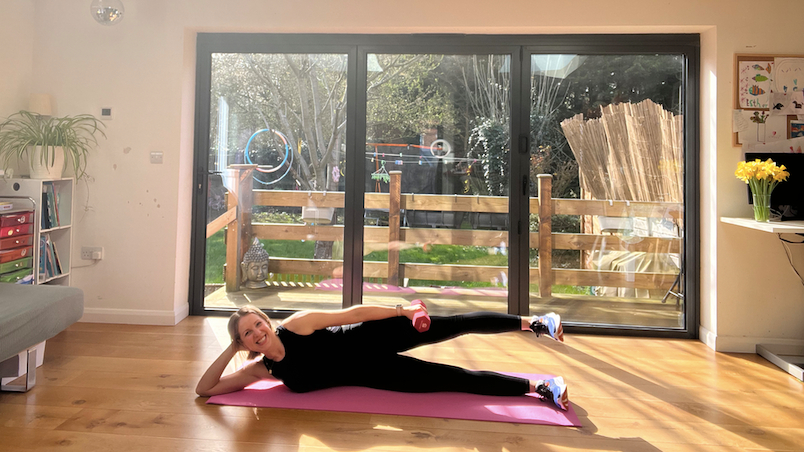
Muscles worked: gluteus maximus
• Lie on your right side on the floor with your body in a straight line, hips, knees and feet stacked on top of each other.
• Put your arm straight on the floor under your head or bend your elbow and hold your head in your hand.
• The other hand will be holding a dumbbell, which you will place at the top of your left thigh.
• As you exhale gently raise your left leg off the lower one and push against the resistance of the weight. Inhale and lower the leg back down with control to meet the right leg. Repeat for 30 seconds on one side then swap legs.
There are many ways to help support your body to reduce the effects of menopause symptoms. Strength workouts like this develop muscle, work your core, improve your balance, and promote circulation, while also boosting your metabolism.
But it's worth also coupling this routine with a menopause abs workout to directly target your core. This will increase the effects, helping stabilize your body, and bosot your performance in the strength workout.
Plus, you can also include a few menopause HIIT workout sessions if you want to focus on your cardio fitness and burn fat. It's also important to focus on how you eat as well, and this menopause diet plan gives your body all the nutrients you need.
Maddy Biddulph is a journalist specializing in fitness, health and wellbeing content, with 26 years in consumer media working as a writer and editor for some of the bestselling newspapers, magazines and websites in the US and UK, including Marie Claire, The Sunday Times and Women’s Health UK.
She is a CIMPSA-certified PT and works one-on-one with clients, as well as running Circuits Club classes which mixes cardio and strength training and chair-based exercise classes for seniors.
